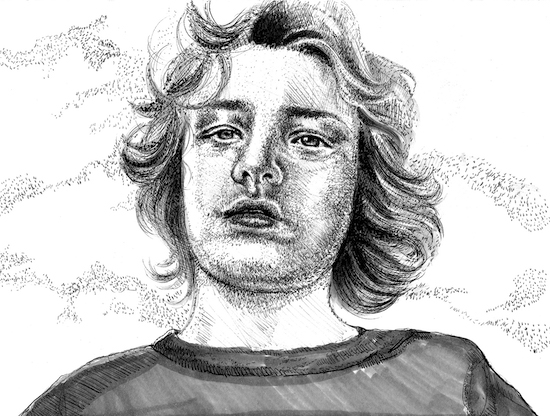Illustration by Rioka Hayama
The skateboarding world is a highly complex and mysterious enigma, represented by misinformed stereotypes that typically lead to wildly incorrect depictions of who and what makes up skateboard culture. Parents frown upon its risk and the culture that it condones. Police, teachers, and business owners seem to have an inexplicably deep rooted hatred for any kid they see rolling past on a skateboard. Rarely do these outsiders get an opportunity to peek into the magical world that skateboarding truly is, whether it be due to lack of an open mind or the fact that it’s a pretty guarded world without a lot of crossovers into other parts of mainstream media. So when Jonah Hill announced his plans to make a film, Mid 90s, centered around skaters and skate culture in Los Angeles, it was interesting to see what kind of crowd the film would attract. Hill is a well established actor whose comedic roles have brought joy to many. But profiling a culture that seems to purposely avoid the mainstream spotlight, is a tall task to tackle as a directorial debut. All in all, Hill does bite off a little more than he can chew, creating a storyline that is pretty rough around the edges. Yet through its flaws, shines a fantastic soundtrack, gut-wrenching as well as heartwarming moments, and surprisingly profound acting performances from unexpected places. It wasn’t the wild success that the fantastic previews had fans hoping it would be, yet definitely not a flop, Mid 90s resonates as a nostalgic and fleetingly beautiful film, both aesthetically and intrinsically.
This coming of age indie film was released by A24, an American independent entertainment company that released other critically acclaimed films such as Lady Bird and Moonlight. The film follows the story of a 13-year-old boy named Stevie, played by Sunny Suljic. He lives in an abusive home in Los Angeles during the mid 1990s, although a specific year is never given. Stevie is trying to figure out who he is, as most 13-year-old boys are. He lives with his mom and his extremely violent older brother Ian. To get away from his abusive brother, Stevie starts hanging out at a local skate shop and quickly befriends the other kids who hang out there.
As the movie progresses and Stevie gets acclimated to skateboarding and skate culture, we learn more about the other characters in the film, and their personal stories. We watch as Stevie and the other skaters battle through hardships, get in and out of trouble, and have a great time, all while skateboarding. The film falters at times, with awkward transitions and predictable humor, and never really fully tells the story of any one character, including Stevie. We never learn why Ian is so violent, where Stevie’s dad is, and there are a few random and inexplicable scenes that involve Stevie that make no sense with the storyline, leaving us to speculate what the meaning might be. That being said, I have never seen a movie that captures emotions so well, without having to try. I was hit with an emotional sense of happiness and nostalgia as I watched Stevie learning how to skateboard and learning how to ollie, the first trick that most skaters learn. I remembered the exact moment that I was in his position, and the film perfectly recreated that wonderful moment. It was not overdone and it was so accurate to what learning to skateboard really feels like. All the boys in the film are skaters in real life, so it doesn’t feel like they’re pretending to be skaters, but rather, like skaters pretending to be actors. This creates a truly authentic, albeit slightly awkward, feeling that really pays respect to what skateboarding culture is all about.
A review of this movie is not complete without shouting out Na’kel Smith. Pro skater, rap artist, and apparently now actor, Smith is an exceptional talent. In the film he plays Ray, the clear leader of the group of skaters that Stevie hangs out with. Smith displays an exceptional ability to show the depth of his character, while at the same time, humbling everyone else around him in the film and grounding the characters. In one scene, where Stevie is having a particularly rough time with his home life, Ray sits down next to him and gives a little insight into how rough all the other skaters in the group have it. He then tells Stevie, “A lot of the time, we feel like our lives are the worst, but I think if you looked in anybody else’s closet, you wouldn’t trade their sh*t for your sh*t … so let’s go.” This is where the viewer really understands how important skateboarding is to Ray and the rest of the group. It’s not just a hobby, it’s an escape. Lines like this by Smith carry the film, and it can not be overstated how fantastic his performance was.
I’m excited to see if Hill can build off of his debut, and create more cohesive, yet equally emotive content in the future. If he can, then the possibilities for where he could take his filmmaking career are infinite.


